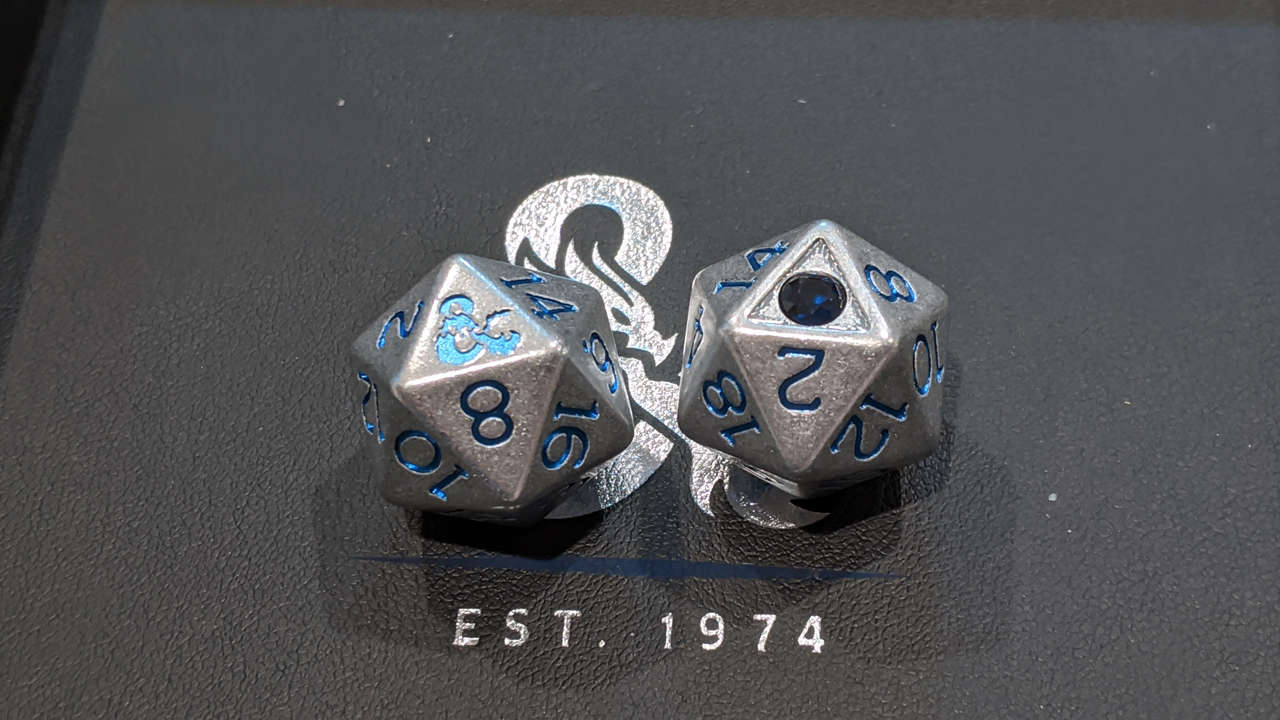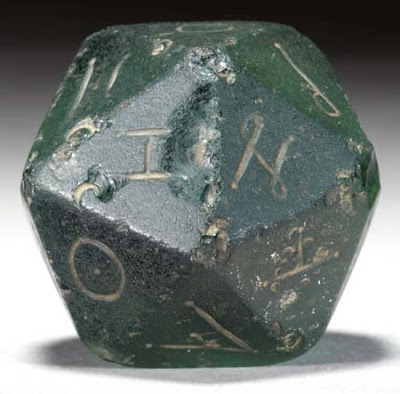I don’t think I need to convince anyone that dice are cool. But for those who feel dice are only useful for looking pretty and making a clattery sound behind a GM’s screen, I disagree.
In such articles, the conversation is about taking control of the story and making sure the results do the best thing for the adventure rather than accept a random result. It makes sense, and in many games I’ll ignore my dice (as a GM that is, for a player that’s called cheating) to work in the best interest of the story to get a more satisfying outcome for the players and the game.
But while I do agree with the odd fudging, I have to also council against it, and suggest your story may be a lot better because of the randomness so often eschewed by ardent story gamers. Quite simply, a random result will not only test your storytelling but also get you out of a rut.
The same goes for the gamemaster. It doesn’t hurt to let fate take over the driving seat now and again. While it might not always take you down the best route, a random dice roll will take your game somewhere unexpected. When the game slides onto a path even the GM didn’t predict, you are all suddenly on a mystery tour. As a GM I find that exciting, because I want to know what’s going to happen as much as the players do. It may mean a little more improvising but that can be part of the fun. Either way, just like creating a random character you will go somewhere you don’t usually go, and tell a story you don’t usually tell. If it isn’t working you always have the option to pull the adventure back onto more familiar ground by fudging the next dice roll. But give it a chance before you do as sometimes the most jarring paths can take you to a very interesting place if you take just a few more steps down that road.
I even include expert characters in this. While your thief might be a world-renowned locksmith, no one has a 100% change of success every time. Even experts fail now and again. So, don’t get hung up on the idea that it is part of your character that ‘they never fail to pick a lock’. Embrace the fact they are imperfect and can have a bad day and ask yourself how they deal with the fact they have failed.
As it often does, Pendragon offers a model for this with the personality traits. Even the most Chaste or Brave knight might fall victim to the charms of an enchantress or be struck by cowardice before a big battle. They are human, it happens. The question then becomes how do they cope with this failure, and how does it affect their position in the group? Can they make amends, will they overcome the lack of confidence, and what will they feel the next time they are called upon to face a similar test?
So, in short, don’t always take too much control of the story. Let go a little and see what fate brings you. It may take you somewhere you never even dreamed possible, and you get to roll a few more of those gorgeous shiny polyhedrons you spent all that money on.
Your Turn: How important are dice in shaping your game's narrative?
Fudging Dice Rolls
Recent years have seen an explosion in all manner of gorgeous artisan dice and special editions. It seems every convention I’ve been to I’ve had to add another set to my already over developed collection, whether it was some rainbow dice during Pride at Origins or a set of cool Eldritch Cthulhu dice the next year.In such articles, the conversation is about taking control of the story and making sure the results do the best thing for the adventure rather than accept a random result. It makes sense, and in many games I’ll ignore my dice (as a GM that is, for a player that’s called cheating) to work in the best interest of the story to get a more satisfying outcome for the players and the game.
But while I do agree with the odd fudging, I have to also council against it, and suggest your story may be a lot better because of the randomness so often eschewed by ardent story gamers. Quite simply, a random result will not only test your storytelling but also get you out of a rut.
Digging Out of a Rut
We all fall into storytelling ruts. Many players have a certain type of character they love to play, and GMs do the same thing with favourite types of encounter and NPC. There isn’t especially anything wrong with this if that’s what you enjoy playing. But if you are finding your game seems have become a little samey, you need to go a bit random. Instead of choosing character options, roll them by the book and take whatever you get, no matter how unoptimised or odd. Then take all that randomness and make it fit together. Not only will you get a character you have probably taken a lot more time to think about, but also something you don’t usually play. You might hate it, but if so, you can always create a new character, and at the very least you may have gained few interesting ideas you’ll want to use again.The same goes for the gamemaster. It doesn’t hurt to let fate take over the driving seat now and again. While it might not always take you down the best route, a random dice roll will take your game somewhere unexpected. When the game slides onto a path even the GM didn’t predict, you are all suddenly on a mystery tour. As a GM I find that exciting, because I want to know what’s going to happen as much as the players do. It may mean a little more improvising but that can be part of the fun. Either way, just like creating a random character you will go somewhere you don’t usually go, and tell a story you don’t usually tell. If it isn’t working you always have the option to pull the adventure back onto more familiar ground by fudging the next dice roll. But give it a chance before you do as sometimes the most jarring paths can take you to a very interesting place if you take just a few more steps down that road.
The Glory of Failure
It’s at this point I should add a note about one of the best things about dice, failure. Failure is good, and possibly one of the best storytelling devices you will ever find. Sure, it might suck to be the thief who fails to pick a lock or the group who fails to take down the villain. But such events only start new stories. If the lock can’t be picked, the party isn’t going to just go home. They must find a new way to get past the door. If they can’t defeat the villain, they won’t just give up (or shouldn’t if they are true heroes). Instead, they will come back again, and how much more satisfying to overcome a problem that seemed insurmountable the first time.I even include expert characters in this. While your thief might be a world-renowned locksmith, no one has a 100% change of success every time. Even experts fail now and again. So, don’t get hung up on the idea that it is part of your character that ‘they never fail to pick a lock’. Embrace the fact they are imperfect and can have a bad day and ask yourself how they deal with the fact they have failed.
As it often does, Pendragon offers a model for this with the personality traits. Even the most Chaste or Brave knight might fall victim to the charms of an enchantress or be struck by cowardice before a big battle. They are human, it happens. The question then becomes how do they cope with this failure, and how does it affect their position in the group? Can they make amends, will they overcome the lack of confidence, and what will they feel the next time they are called upon to face a similar test?
So, in short, don’t always take too much control of the story. Let go a little and see what fate brings you. It may take you somewhere you never even dreamed possible, and you get to roll a few more of those gorgeous shiny polyhedrons you spent all that money on.
Your Turn: How important are dice in shaping your game's narrative?






